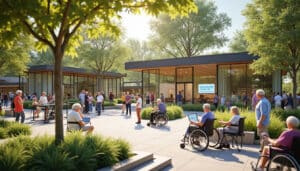Understanding aging is essential for grasping the evolutions of our contemporary societies. This concept encompasses not only the biological and physiological transformations that affect individuals over time but also the social, economic, and health challenges that arise from it. As the global population ages rapidly, shifting from a minority to a majority of individuals over 60 years old, it becomes crucial to explore the issues associated with this demographic transition. The implications for health systems, public policies, and intergenerational relationships deserve particular attention in order to better respond to the needs of the elderly and ensure their integration and quality of life.
The term aging refers to a complex biological and social process that accompanies an individual’s life. It is generally defined as the progressive accumulation of damage at the cellular and molecular levels over time, leading to changes in an individual’s physical and cognitive abilities. This phenomenon affects all human beings and begins from early childhood, although the most marked effects are visible at an older age.
With the current demographic evolution, the older population is growing exponentially. Forecasts indicate that the proportion of people aged 60 and over will rise from 12% to 22% by 2050. Therefore, it is crucial to understand the challenges related to this population aging. Elderly individuals represent a diverse group with varied needs that depend on their health status, social environment, and culture.
The health issues frequently associated with old age include hearing loss, cataracts, osteoarthritis, diabetes, as well as mental disorders such as depression and dementia. These conditions require particular attention, as they can have significant repercussions on the quality of life of seniors. Furthermore, geriatric syndromes such as frailty and confusion states highlight the necessity of a multidimensional approach in the management of older individuals.
From a social perspective, aging is not only a health issue; it also involves economic, political, and community considerations. The lack of appropriate solutions to support this growing population could lead to significant challenges for health care and social security systems. Therefore, the planning and implementation of public policies must take into account the increasing demand for health services tailored to older adults.
One of the major challenges lies in how society perceives and interacts with older individuals. Stereotypes and ageist attitudes can often lead to a lack of respect and dignity in the treatment of elderly individuals. This raises questions about the role that governments and communities should play in promoting a healthy and active aging.
The concept of positive health in old age is a determining factor that enables older adults to remain active and socially engaged. By fostering environments conducive to a healthy life, including easy access to health care and enriching activities, it is possible to maximize the quality of life for seniors.
Recent initiatives, such as the Decade of Healthy Aging (2021-2030) proclaimed by the United Nations, aim to promote a longer and healthier life for older adults. This global collaboration calls for the identification and implementation of tailored strategies to address the challenges of aging. Among the priority objectives are: changing societal perceptions, strengthening communities, and improving comprehensive person-centered care for older adults.
Finally, the aging population also encompasses economic opportunities. Indeed, it is possible to find innovative solutions and businesses capable of meeting the needs of older adults while revitalizing the local economy. Research on aging, such as that conducted by King’s College London, paves the way for new approaches to address these challenges.

FAQ on Aging: Definition and Issues
What are the main issues related to the aging population? The issues include the need to adapt social and health systems to respond to the increase in the number and proportion of elderly individuals, particularly in low- or middle-income countries.
What are the health problems commonly associated with aging? Common issues include hearing loss, cataracts, osteoarthritis, depression, and dementia, often exacerbated by the simultaneous presence of multiple conditions.
Why is the aging population a significant phenomenon today? The population aged 60 and over is continuously increasing, raising questions about the well-being, health, and integration of seniors in society.
How can we promote healthy aging? By encouraging healthy behaviors such as a balanced diet and regular physical activity, as well as creating physical and social environments that are supportive.
What are the impacts of the environment on aging? The environment, including housing and neighborhood, directly influences the health and activity opportunities of older adults, affecting their quality of life.
How can society better support the elderly? By combating ageist stereotypes, improving infrastructure, and providing care tailored to individuals’ needs.











